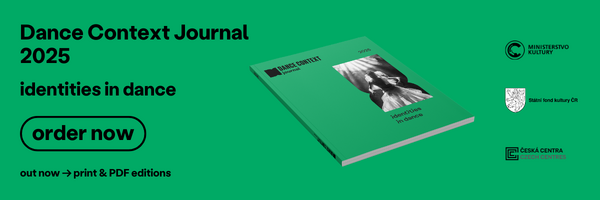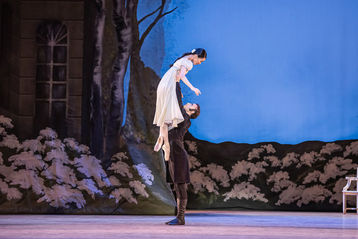John Cranko’s Onegin still capable of surprising, but in need of therapy
Exactly sixty years ago, the first version of Onegin, arguably John Cranko's most famous ballet, premiered in Stuttgart. It would receive its final cut two years later, followed by international acclaim another two years after that, during a tour of the United States. Since then, the ballet has been performed with unfailing success throughout the world. Just this season, it is being performed simultaneously by The Royal Ballet in London and its French counterpart, The Opéra National de Paris, with Onegin returning to the latter after eight years.
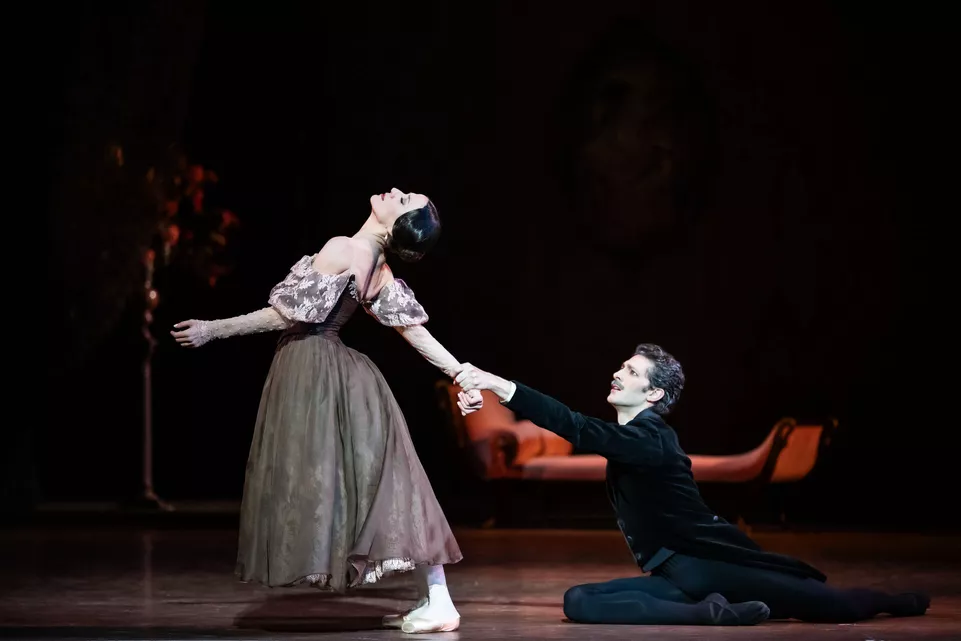
Onegin. Photo: Julien Benhamou.
"An ear to my confession lend; to thy decree my will I bend"
Cranko first discovered the story of Alexander Sergeyevich Pushkin's novel in London in the 1950s, through Peter Ilyich Tchaikovsky's opera of the same name, and longed to bring it into the world of dance. After his first rejection, he successfully attempted to take up the same title a few years later in his new home in Stuttgart. However, Tchaikovsky's opera score was not recommended as a fitting bed for the new production, so Cranko teamed up with musical director Kurt-Heinz Stolze, who arranged a selection of Tchaikovsky's compositions (from the piano pieces from The Seasons and the Impromptu in A flat major, to the symphonic poem Francesca da Rimini, the concert duet Romeo and Juliet, excerpts from the opera Cherevichki, and Overture in F major) into a coherent piece that is particularly well thought out in its use of recurring musical themes and motifs.
The same principles are also used by Cranko as choreographer and director. His Onegin could be called a ballet of mirrors, as they are present throughout the three-act piece. In the opening scene, Olga and Tatiana, according to an old Russian folk tradition, are looking into a mirror in the hope of seeing their future husband. In the very last scene, Tatiana sees her incoming husband, Gremin (the same name as he has in Tchaikovsky's opera), in the mirror's reflection. The mirror also plays a role in the second scene of the first act, when the title character himself emerges from it into Tatiana's dream to sweep her up into his arms in a whirlwind of a romantic duet. Pushkin himself also makes use of mirroring through the love letters of his two central characters. Cranko translates the rejection of these letters onto the stage as a violent, forceful tearing at the hands of the recipients.
The ballet's libretto draws clearly from the opera, to the point that one sometimes cynically wonders whether the choreographer really wanted to adapt Pushkin's book or whether he just translated its dramatisation by P.I. Tchaikovsky and K. S. Shilovsky. In all fairness, as strong and powerful the storyline of Pushkin's Eugene Onegin is, it is still a novel in verse, laced with highly lyrical scenes. Written in the third person, but by an unreliable narrator, who inserts himself into the action and, by breaking down the fourth wall, regularly addresses his audience, which does not make an ideal starting point for a work of theatre that, by definition, needs dramatic situations. Even more so then, for a dance piece that has to manage without words. From this perspective, I can logically understand some of Cranko's directing choices. Furthermore, it is impossible not to acknowledge that the ballet that he has created is brilliantly put together and has a coherent, skillfully composed structure. However, the more I watch Onegin, the more problematic I find the deliberate deviations and wilful detours from Eugene Onegin.
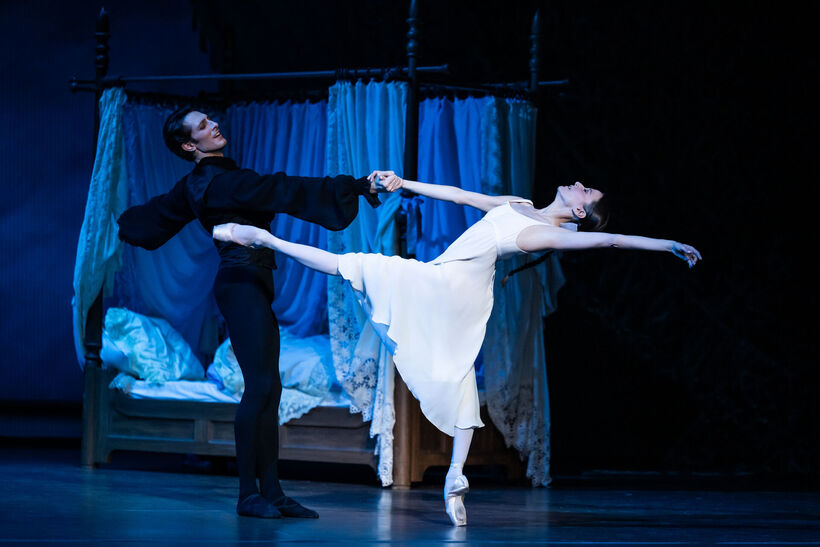
“Though he ne’er designed to slay himself with blade or ball, indifferent he became to all”
With Cranko, the story is condensed. Although the ballet is three acts long, the full length, including two intermissions, fits comfortably under 135 minutes. Stage shortcuts are a great invention, but if condensing the key events leads to their flattening, or the flattening of the characters involved, I consider that quite the problem, especially when the complex, ambiguous, and layered characters become mere templates, faded copies of their literary predecessors. To avoid any misunderstanding, Cranko's Onegin still provides the dancers with one of the best stories to tell and experience in dance and, one can hardly contest the genius of Tatiana and Onegin's last, emotionally exuberant pas de deux, the desperation and agony of the scene before the duel between Eugene and Lensky, the rising tension of the Larina family party with its foreboding bubbling conflict, and even the romanticism of Tatiana's literal dream duet with her chosen one.
All of these aforementioned scenes are examples of varying degrees of deviation from Pushkin's text that might be successfully viewed as necessary for the theatre situations to be effective. Lensky's slapping of Onegin with the subsequently thrown glove is considerably more dramatic than sending a formal written message. Similarly, the sisters' presence at a deserted forest clearing at dawn, where two former friends are about to put a bullet in each other's heads, is more comprehensible and impactful in its effect on the audience as it multiplies the emotional tension. I may perhaps also try to understand the dismissal of the two main male characters' friendship at the expense of Lensky's romance with Olga. Yet, why Cranko choses to transform Tatiana's dark dream of Pushkin, full of terrifying woodland creatures, and Onegin's morally ambiguous, albeit affectionate demeanour, into an uncomplicated love scene which feels like the fulfillment of the ballet cliché of at least one reciprocated, saccharine-sweet romantic duet between the main characters in every piece, remains a mystery to me. The potential answer, that this is yet another example of the mirroring and that this duet is a counterpart to the final scene, is not as grounded for me as it probably was for the choreographer and his team.
But by far the strongest discrepancy I regularly find myself fighting with is the portrayal of the characters themselves. Onegin, regardless of its name, is much more Tatiana's ballet — not only does her presence on stage open and close the piece, but Cranko also presents her as an Ancient Greek heroine, standing with clenched fists on a vacant stage in the finale, as a manifestation of the triumph of morals and fidelity in marriage, even at the cost of great personal sacrifice. What he ignores, however, is that Tatiana, by the end of Pushkin's novel, carries bitterness and hurt, as well as frustrated resignation over the loss of her village life, and a suppressed yet profound dissatisfaction with her new social status and the role she has had to learn to play and carry with seeming poise as the wife of a general, notwithstanding her inner torment, as nothing could possibly be farther from who she was and who she always wanted to be. While I find the omission of these facets of her character development problematic, it is not as fundamental as Cranko's oversimplified depiction of the eponymous (anti-)hero (and I'm not talking about his moustache in the last act, which, as an aristocrat without a relevant military position in nineteenth-century Czarist Russia, he simply would not have had, a battle that has only ever been won by The Bolshoi back in 2013).
“He’s a freemason, so we think, alone he doth his claret drink”
Eugene Onegin is a cynical, bored, pompous cad. A bit of an egoistic poser, a bit of a callous prig, a very much tormented, troubled soul full of spleen and world-weariness (in some ways he is actually a more authentic offspring of Romanticism than Lensky ever could have been). He is complicated and possibly rather insufferable in his not-so-veiled, yet strangely sophisticated arrogance. But he is not a willfully cruel villain who ostentatiously tears Tatiana's letter to pieces in front of her eyes and dances and flirts afterwards with her younger sister Olga in order to spitefully, and for his own amusement, rub salt in her wounds. Mainly because he dances with Olga in order to show Lensky, in an acute fit of pettiness (and all-consuming boredom), how shallow her feelings for him are. And he treasures the letter, however he may reject its confession for years because he recognises the honesty and pure emotion in it. His actions undoubtedly negatively affect countless lives. But it is his own that he ruins the most.
Thus, to meet the often conflicting demands of Cranko's libretto and Pushkin's novel seems challenging at the very least. However, it is not impossible, as The Opéra National de Paris confirmed to me when performing the ballet back in 2018. That was when the lead couple, performed by Ludmila Pagliero and Mathieu Ganio, successfully captured the very aspects of their characters that I had always felt were missing. Tatiana's muted pain hidden behind the glitz of aristocratic society and Onegin's gentle yet clear rejection, in which even the tearing of the letter allowed Pushkin's verses to come through. The same couple of Paris étoiles returned to their roles this year. Pagliero, as Tatiana, conveyed a deeply pensive image, her newly awakened feelings may have compelled her to put her confession of love down on paper, but it was as if even then, in the bloom of the naiveté of her youth, her soul suspected deep down what her heart could not yet know. Every emotion that she portrayed felt visceral and deeply held, free from superficial pathos and flamboyance. Her dream duet with Ganio at the end of the first act carried a fragile intimacy and a hazy reverie, while the last one was brimming with absolute despair from the very beginning (Ganio as Onegin was, after all, thoroughly convinced of the utter futility of his newfound feelings the moment they dawned on him — much to his own shock during the ball at the Gremins'). I also cannot gloss over Tatiana's brief interaction with her husband before the grand finale, in which she did not throw her arms around Gremin's neck, but huddled desperately in his arms in an attempt to protect herself from her fevered thoughts and to convince herself of the stability and emotional fulfillment of a harmoniously calm but passionless marriage. During the final pas de deux, both she and Onegin knew all along that there was no shared path for them, that there was nothing one or the other could do to overturn their fate, that they would just have to live through the painful agony of their ultimate farewell. The duet didn't tear through the scenery with exalted emotions oozing in all directions, but it clenched and crushed the core with an even more profound intensity. Especially when Pagliero, at the very final moment, let Ganio see her thoroughly shattered heart and only then, with her eyes still briefly fixed on his, sent him away with the repeated gesture. This left Tatiana in the middle of the stage, horrified and grief-stricken, and it took her quite a while to understand what she had done and what it had all meant.
The second pair of étoiles, Léonore Baulac and Marc Moreau, portrayed Tatiana's sister Olga and her lover Lensky. The latter gave his character an almost ostentatiously romantic, but for him fully authentic persona of a poet who felt and took everything (including himself) deeply and seriously, which made his behaviour all the more endearing, however much you might have wanted to chuckle at him with the same benevolence as the novel's Onegin. On top of that, he possessed a brilliant jump with a sure, soft landing. His concentration on technique slightly limited him in his variation before the duel though, and he only found his poignant despair at the very end of the scene and in his furious and stubborn interaction with Onegin. Baulac as Olga was also downright delightful in her impishness. I cannot, however, help feeling that although she is a great match to the younger Larina, as an artist, she would have been more deserving of the role of Tatiana, in which she could have brought to bear a much wider range of the acting skills that she possesses.
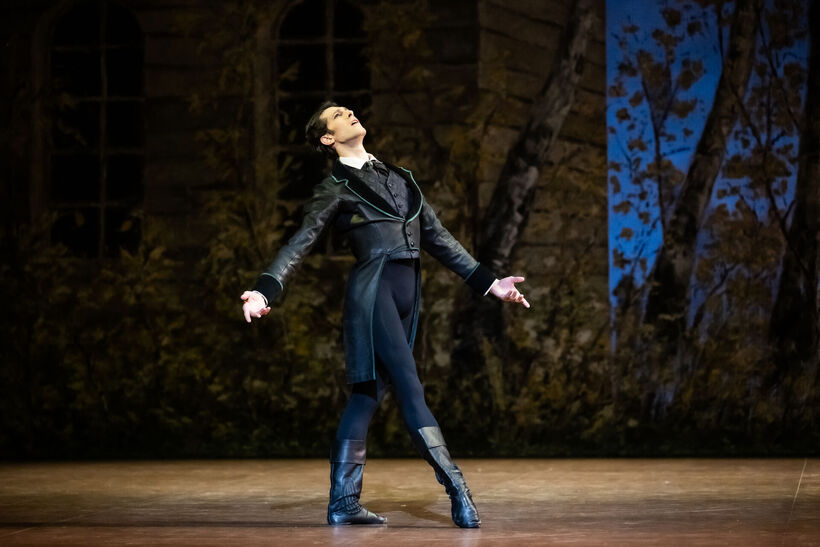
“When deaf and silent he doth lie heedless of your despairing cry?”
A well-developed acting range is also a necessity for the eponymous Onegin, because his character is as much, if not more, of a juicy challenge for the male dancer as Tatiana is for the ballerina. If Pagliero followed a similar path in her portrayal as she did in 2018, Ganio portrayed a very different Onegin. More distant, less approachable, more outwardly cold and hard. Hiding behind a mask crafted to frightening perfection, where one is not quite sure what is concealed underneath and what is the truth. He appeared in the village with unwavering self-confidence and in full knowledge of the undeniable power of his charisma (that can be translated as “I stand, therefore I am”). And then came his variation in the park (so heart-achingly beautiful in its unmistakable musicality and physical lyricism), essentially the only substantial opportunity to glimpse the real Onegin. An Onegin who, this time, was anguished and in pain, haunted by all sorts of inner demons, longing desperately for something unattainable through his endless lines of arabesques, and ultimately paralysed by a palpable, tangible sense of utter pointlessness that makes everything and everyone worth nothing.
In his actions, he tries to be strictly rational, since the cut then is more clinical, cleaner, supposedly painless, thus not seeming to do as much harm (especially to the person who made it). Failing to suppress his emotional reaction, his anger at the loss of control only makes the whole situation worse (albeit followed by bitter remorse and then a swift return to the mask of indifference). Ganio's Onegin fights with himself only to eventually make the worst decisions in anger, resulting in an ever-growing, never-ending stream of crippling regrets visible during his fleeting moments on the front stage. It was in fact fitting that, although he was driven to the final duet by his tumultuous feelings, he initially tried to tame them and view the anticipated confrontation with Tatiana through a reasonable, sober lens. As if he did not want to prove his love to Tatiana by showing overt emotion at first, but to simply explain it.
Arguably the most powerful moment for me, oddly enough, didn't occur in the last act, but during the scene before the duel with Lensky. At the moment when Onegin, whose attempts at reconciliation are rebuffed again and again by his friend and ends with another slap in the face, finally decides to raise his gun. The vast majority of the dancers read the moment as an outburst of fury and consequent toughness. At that moment, Mathieu Ganio portrayed an Onegin who had been torn to pieces by Lensky's tenaciousness and who at that moment was pierced by a searing pain so intense that it nearly drove him out of his mind.
With a sixty-year-old piece, particularly when knowing it basically by heart, one doesn't necessarily expect to be surprised, let alone shocked. That makes it all the rarer to find artists who possess this ability and who make you want to revisit and rediscover these familiar works again and again. Mathieu Ganio, who will end his twenty-two-year career as an étoile on 1 March this year, is certainly such an artist. And since The Opéra National de Paris has now cancelled the livestream originally planned for 21 February, you may never have the chance to see it for yourself...
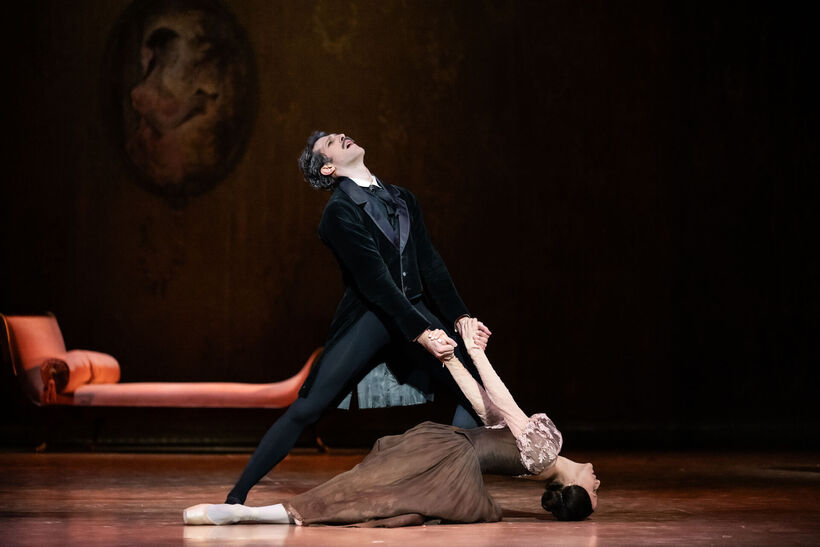
Written from the opening night of 8 February 2025, Palais Garnier, Paris.
Onegin
Choreography and Direction: John Cranko
Libretto: John Cranko after Alexander Sergeevich Pushkin
Music: Petr Iliych Tchaikovsky, arranged by Kurt-Heinz Stolze
Conductor: Vello Pähn
Costumes and Stage Design: Jürgen Rose
Light Design: Steen Bjarke
Staged by: Jane Bourne
Supervisor: Reid Anderson-Graefe



